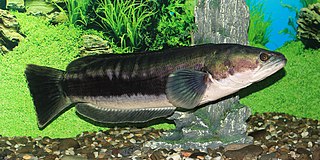
Synbranchiformes, often called swamp eels, though that name can also refer specifically to Synbranchidae, is an order of ray-finned fishes that are eel-like but have spiny rays, indicating that they belong to the superorder Acanthopterygii.

The swamp eels are a family (Synbranchidae) of freshwater eel-like fishes of the tropics and subtropics. Most species are able to breathe air and typically live in marshes, ponds and damp places, sometimes burying themselves in the mud if the water source dries up. They have various adaptations to suit this lifestyle; they are long and slender, they lack pectoral and pelvic fins, and their dorsal and anal fins are vestigial, making them limbless vertebrates. They lack scales and a swimbladder, and their gills open on the throat in a slit or pore. Oxygen can be absorbed through the lining of the mouth and pharynx, which is rich in blood vessels and acts as a "lung".

Chaudhuriidae, is a family of small freshwater eel-like fish related to the swamp eels and spiny eels, commonly known as the earthworm eels. The known species are literally the size and shape of earthworms, thus the family name. While one species, Chaudhuria caudata was reported from the Inle Lake by Nelson Annandale in 1918, the others have been only recently reported, all in the eastern Asia area, from India to Korea.

Channa is a genus of predatory fish in the family Channidae, commonly known as snakeheads, native to freshwater habitats in Asia. This genus contains about 50 scientifically described species. The genus has a wide natural distribution extending from Iraq in the west, to Indonesia and China in the east, and parts of Siberia in the Far East. A particularly high richness of species exists in Myanmar (Burma) and northeastern India, and many Channa species live nowhere else. In contrast, a few widespread species have been introduced to several regions outside their natural range, where they often become invasive. The large and medium-sized Channa species are among the most common staple food fish in several Asian countries, and they are extensively cultured. Apart from their importance as a food fish, snakeheads are consumed in some regions as a traditional medicine for wound healing and reducing postoperative pain and discomfort, and collected for the international aquarium pet trade.

Gymnothorax is a genus of fish in the family Muraenidae found in Atlantic, Indian, and Pacific Oceans. With more than 120 species, it the most speciose genus of moray eels.
Macrognathus is a genus of eel-like fish of the family Mastacembelidae of the order Synbranchiformes.

The Liberian swamp eel is a species of fish in the family Synbranchidae. It is indigenous to Liberia. It has also been found in Sierra Leone, with an unconfirmed report from Côte d'Ivoire. It was first described by Jacques Pellegrin in 1922 as Typhlosynbranchus boueti, but was later moved to Monopterus. However, a 2020 study revived Typhlosynbranchus. Due to the deficiency in data, the species has not been classified with respect to endangerment.

Monopterus is a genus of swamp eels native to Asia. They live in various freshwater habitats and some have a fossorial lifestyle.
The Bombay swamp eel, also known as the paytop in Marathi, is a species of fish in the family Synbranchidae. It is endemic to the state of Maharashtra in India.

Ophisternon is a genus of swamp eels found in fresh and brackish waters in South and Southeast Asia, New Guinea, Australia, Middle America and West Africa. Two species are blind cave-dwellers.

The Asian swamp eel, also known as rice eel, ricefield eel, rice paddy eel or white rice-field eel, is a commercially important air-breathing species of fish in the family Synbranchidae. It occurs in East and Southeast Asia, where it is commonly sold and eaten throughout the region. It has been introduced to two areas near the Everglades in Florida and near Atlanta in Georgia.

Cavefish or cave fish is a generic term for fresh and brackish water fish adapted to life in caves and other underground habitats. Related terms are subterranean fish, troglomorphic fish, troglobitic fish, stygobitic fish, phreatic fish, and hypogean fish.

Rhynchoconger is a genus of eels in the family Congridae.
Ophichthys desilvai is a commercially important, air-breathing species of fish in the family Synbranchidae. It is endemic to Sri Lanka and is the only endemic synbranchid from there.
Rakthamichthys rongsaw is a species of swamp eel discovered in the Khasi Hills in northeast India. The researchers were searching for caecilians, when they uncovered the eel in soil.

Synbranchinae is a subfamily of swamp eel, consisting of six of the ten genera in the family Synbranchidae. The remaining genus, the monotypic Macrotrema is the only one in the other subfamily Macrotreminae. The subfamily occurs in the Neotropics, Afrotropics and Asia.
The Malabar swamp eel is a species of troglobitic swamp eel endemic to subterranean springs in Kottayam in the Indian state of Kerala.

Typhlosynbranchus is a genus of swamp eels that are native to West and Central Africa. It contains two species that were formerly classified in the primarily Asian genus Monopterus.

Ophichthys is a genus of swamp eels native to South Asia. They live in freshwater or subterranean habitats, and some have a fossorial lifestyle.











